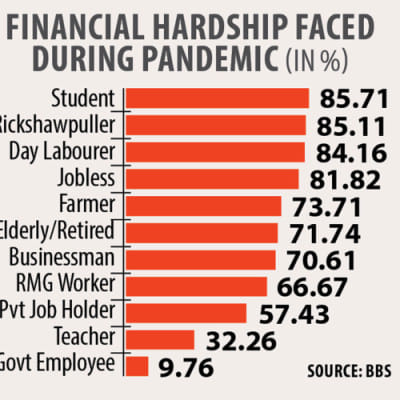Students, labourers worst-affected by pandemic

According to a Bangladesh Bureau of Statistics (BBS) survey conducted between September 13 and 19, students, rickshaw pullers and labourers have been hardest hit by the economic downturn created by the coronavirus pandemic. The report on this survey, which was released on Tuesday, stated that 85.71 percent of students, 85.11 percent of rickshaw and van pullers, and 84.16 percent of labourers said they had faced financial hardships as a result of the pandemic.
This is cause for concern indeed. While the economy is slowly picking up despite the strong presence of the coronavirus in Bangladesh (especially in urban centres), with lower unemployment rates in September compared to the dire state in which we were in July, when the unemployment rate rose to 23 percent—there are still countless Bangladeshis who are struggling to make ends meet. The government stimulus packages have provided support to formal industries, especially the export-oriented ones, and have most likely avoided a negative economic impact of far greater consequence than we are facing at the moment. However, the informal sectors have gotten less support, which is now evident from the financial struggles that are being faced by rickshaw pullers and day labourers. In early April, the government announced direct cash assistance worth Tk 7.6 billion for informal sector workers. How efficiently and transparently has this cash assistance been distributed? The next logical step, after the release of the findings of the BBS report, would be for the authorities to investigate this matter immediately.
The high proportion of students who are reported to be facing financial hardships also require the government's attention. The future of our students is already in peril as a result of the prolonged closure of educational institutions and the sceptre of unemployment looming above the heads of soon-to-be graduates. In this daily, we have already initiated many conversations on online education and how students from low-income backgrounds may be falling behind due to the digital divide. We must also remember that these students and their families are highly likely to be struggling to pay tuition, rent and other education-related costs as well, especially those studying in private universities. We urge the government—as well as the educational institutions that they belong to—to implement specific policies aimed at easing the financial burdens being faced by these students, especially since the struggles they are facing now could end up hampering the flow of their education and having a long-term impact on their lives which, in turn, will affect the nation's development.

 For all latest news, follow The Daily Star's Google News channel.
For all latest news, follow The Daily Star's Google News channel. 



Comments